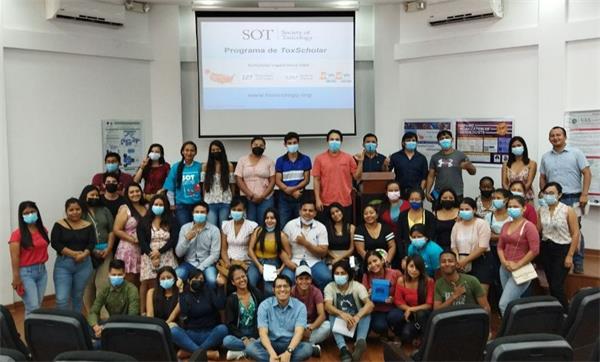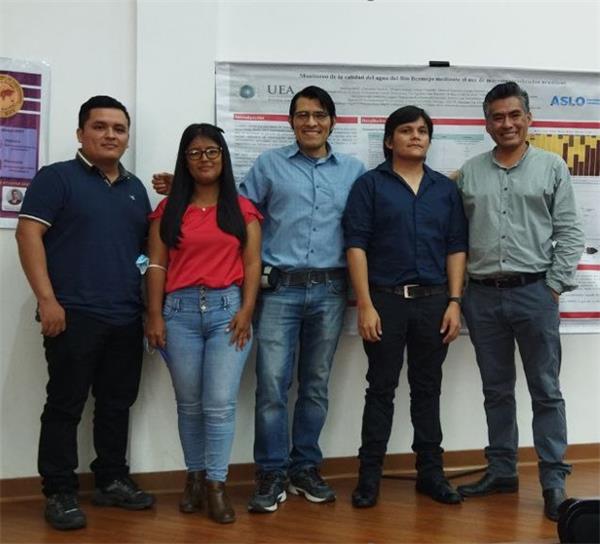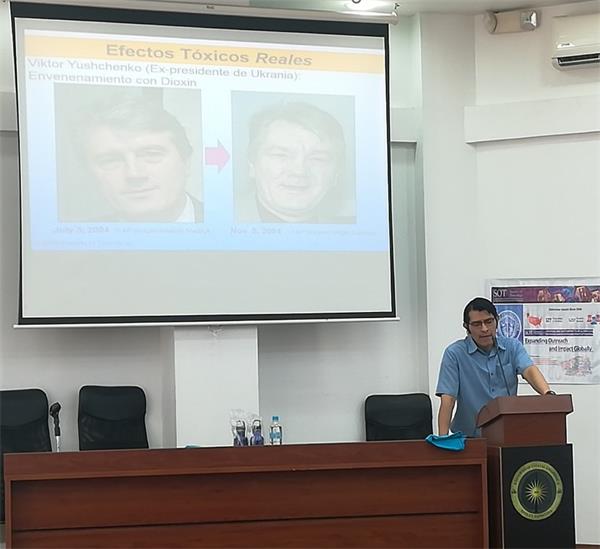
Participants in the ToxScholar presentation at
the Universidad Estatal Amazónica in Ecuador.
I worked at the Universidad Estatal Amazónica (UEA) as teaching and research faculty in the Northern Ecuadorian Amazon (NEA) region from 2018 to 2020. UEA is one of the few public higher education institutions in the NEA region. This institution provides public education to a population of about 1,100 students majoring in biology or tourism. It is located in Lago Agrio, one of the largest cities of the Ecuadorian Amazon, where businesses and families have grown around the oil industry since the 1960s. Even though this industry has brought jobs and urbanization to the region, it also has altered the environment and way of living for many generations and indigenous communities.
Although I am Ecuadorian, 2018 was the first time that I visited, let alone lived in the NEA region. I was excited and looked forward to the personal and professional opportunities that working and living there would provide. Working in higher education in the Amazon region was a privilege, as the natural environment provides the perfect setting for engaging learning and research opportunities with both students and the overall community. However, my time working there also highlighted that those students often lacked a solid knowledgebase in STEM and lacked awareness that their homeland was the source of endless career opportunities in environmental sciences. I left the NEA region just before the COVID pandemic in March 2020 feeling grateful for the experience but also that there was more left to be done.

From the left: UEA students Augusto and Jessica,
ToxScholar Federico Sinche Chele, UEA student
Roly, and UEA undergraduate coordinator
Manuel Cabrera during the Poster Session.
Once I returned to the United States, I reflected on those years in the NEA region and realized that I wanted to provide the students with an alternative way to view their region and their professional future within it. This was the main motivation for me to become a SOT ToxScholar in 2022. I applied for the ToxScholar Outreach Grant to support my visit to UEA to share with its students the mentorship, professional development, and career opportunities that the field of toxicology has to offer to people like them with a background in biology.
To get to the NEA region, I had to drive from Ecuador’s capital city, Quito, through the Andes Mountains, and finally into Amazonia. Currently, the only way to get to this part of the world is by driving since the small airport in the NEA was recently closed by the government. It was an eight-hour drive on treacherous roads with unpredictable weather conditions.
During my visit, I had the opportunity to meet old and new students and to interact with them during my presentation titled “ToxScholar Program in Ecuador.” The audience mainly comprised of undergraduate biology students, followed by a few alumni and faculty. The total turnout was 55 attendees. Through my presentation, the participants were able to learn basic concepts in toxicology (dose-response relationships, common chemicals, acute and chronic effects, etc.) and, most importantly, to recognize the connection between biology and toxicology. We also talked about natural toxins, and it was interesting to hear their perspective on why people sometimes fail to perceive natural plants as sources of highly toxic substances compared to traditional synthetic chemicals. We had a great discussion on the topic, as plants are commonly used for multiple purposes by people in the NEA region.
I also spent some time with students discussing professional development and training opportunities available through SOT and the SOT Hispanic Organization of Toxicologists (HOT) Special Interest Group. HOT was a great partner on this endeavor due to the organization’s emphasis on fostering and creating opportunities in scientific areas associated with toxicology among the international Spanish- and Portuguese-speaking scientific communities. Students had the opportunity to hear firsthand the professional and educational benefits of being part of SOT and HOT.

Federico Sinche Chele presenting on
the toxic effects of chemicals
The last event during my ToxScholar visit was a Poster Session that highlighted toxicology research that I was conducting in the NEA region with local indigenous communities in collaboration with UEA faculty and the Ecuadorian Ministry of Environment. This research provided students with a concrete example of how they could use their education to work and make positive contributions to the NEA region. Additionally, the Poster Session highlighted information for students and faculty to contact SOT and HOT for more information regarding opportunities in the field of toxicology. The Poster Session also allowed attendees to break into small groups and engage in discussions and questions around the presentation and information displayed on the posters in a more informal setting.
I am grateful to Dr. Edison Segura, Director of UEA, and Manuel Cabrera, MSc, who oversees undergraduate studies, for hosting my ToxScholar visit. I also am grateful to SOT and HOT for allowing me to be a part of the ToxScholar program to globally recruit and speak with the new generation of toxicologists from underserved populations. Finally, I want to thank all the people behind the ToxScholar program at SOT for their support and guidance throughout the application and selection process. I will be forever grateful for this extraordinary experience that allowed me to make a small difference in the lives of these students.
#Communique:SOTNews